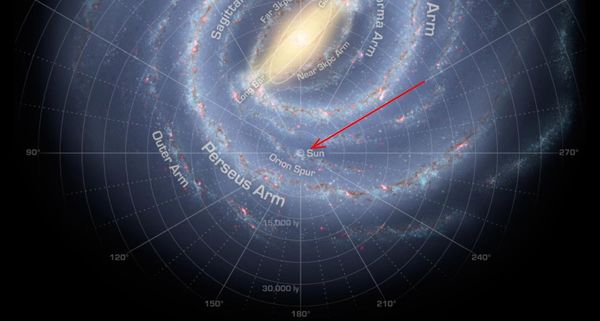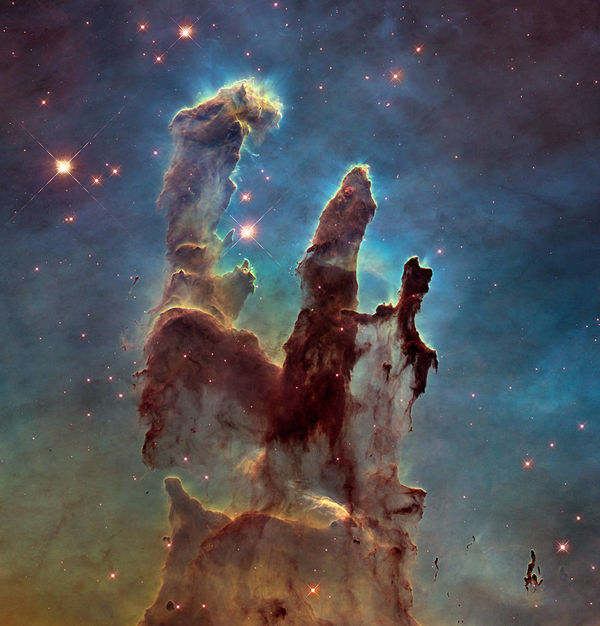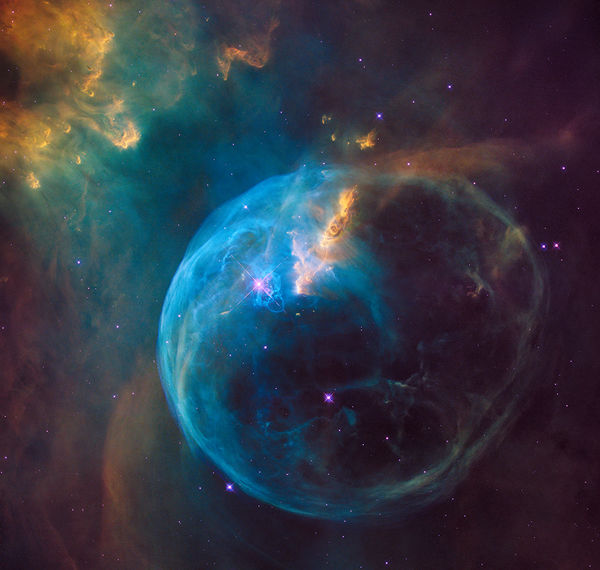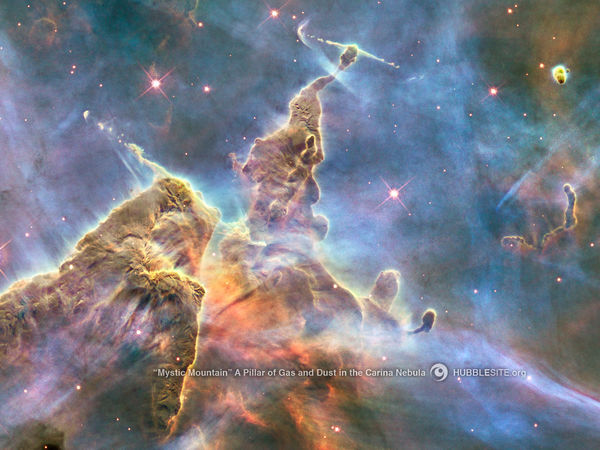Do you think we are alone??
Sep 8, 2019 18:12:19 #
Parky60 wrote:
You call theories "science?"
Everything starts with theories. I suppose you subscribe to the theory of a 6000 year old Earth?
Sep 8, 2019 18:15:17 #
susanblange wrote:
There is life out there. There are Angels in Heaven, and there are demons in Hell.
And if you don’t watch out, one of ‘em’s gonna gitcha! Boom!

Sep 8, 2019 18:18:49 #
kemmer wrote:
Everything starts with theories. I suppose you subscribe to the theory of a 6000 year old Earth?
But theories are not science.
Sep 8, 2019 18:24:44 #
Parky60 wrote:
But theories are not science.
Theories do not exist without considerable evidence to support them.
Sep 8, 2019 18:29:39 #
kemmer wrote:
What is your background in science? Do you know enough about life sciences to understand the conditions that must exist on an exoplanet for life to exist? Do you know enough about the astronomical sciences to calculate the statistical probability of life on other planets? With over a billion stars and their planets in our galaxy alone, the odds are overwhelming that there are many other inhabited planets.
In t***h, the odds are rather low. You can rule out any possibility of life in highly dense regions of the galaxy, such as in the spiral arms, in galactic clusters, in regions of high volumes of interstellar gases and dust, in stellar incubators, and such. Too many catastrophic events like novas and supernovas, too much asymmetrical gravitational forces, too much radiation, too little hydrogen, too many heavy elements. Stuff like that. Even bacterial life forms would have one hell of a time surviving in those regions, and forget any possibilities for advanced life.
Consider for a moment what an intelligent species would face living on a planet in a region of high star density. Big stars, hot stars, bright stars in close proximity, luminous and dark gases and dust all around. There would be no such thing as night, no darkness in which to make any observations beyond the local region of their own system, even the invention of powerful telescopes would be useless. They would never know that they lived in a vast universe, they would never successfully develop any kind of radio communication, and of course they would have to somehow adapt to high levels of radiation, enormous fluctuations in gravitational forces, and the continuous threat of destruction by collisions with other planets, asteroids, comets, and the explosions of dying stars.
Interestingly, our solar system happens to be located at around 25,000 light years from the core of our Milky Way at the edges of a low density region in a minor spur of the Orion Arm. We are fortunate to be here. We can see a long long ways into the deep reaches of the universe. We can study the grandeur and magnificence of creation, we can explore the incredible diversity of the universe and find answers.
The heavens declare the glory of God; the skies proclaim the work of his hands. Day after day they pour forth speech; night after night they reveal knowledge. They have no speech, they use no words; no sound is heard from them. Yet their voice goes out into all the earth, their words to the ends of the world.
Psalm 19.
They that go down to the sea in ships, that do business in great waters; These see the works of the Lord, and his wonders in the deep.
Psalm 107
We are not alone, God is with us.
.


Sep 8, 2019 18:30:33 #
kemmer wrote:
Nope.Everything starts with theories. I suppose you subscribe to the theory of a 6000 year old Earth?
Sep 8, 2019 18:42:44 #
kemmer wrote:
Theories do not exist without considerable evidence to support them.
So where is the considerable evidence to support the theory of evolution?
Sep 8, 2019 18:53:15 #
kemmer wrote:
Theories do not exist without considerable evidence to support them.
Why is it that on "Ancient Aliens" the "supposes" always start with "What if..." Stan Lee has made a FORTUNE on fantasy. It's important to know the difference.
Sep 8, 2019 19:15:45 #
Voice of Reason
Loc: Earth
kemmer wrote:
Theories do not exist without considerable evidence to support them.
WHAT? Ever hear of the flat earth theory? Considerable evidence my a$$. A theory is nothing more than a conjecture or a supposition.
In science (real science, not l*****t pseudo-science), scientists posit theories, then other scientists try to refute those theories. If the theories cannot be easily refuted, such as evolution or relativity, then they become accepted theories. If they can be proven false, such as the flat earth theory, they are replaced with theories that fit known facts.
Sep 8, 2019 19:21:17 #
Blade_Runner wrote:
What is your background in science? Do you know en... (show quote)
You have to let go of the idea that
life as we know it on Earth is the only possibility.
Sep 8, 2019 20:36:08 #
kemmer wrote:
You have to let go of the idea that
life as we know it on Earth is the only possibility.
life as we know it on Earth is the only possibility.
Why?
Sep 8, 2019 21:17:53 #
waltmoreno wrote:
I'd simply refer you to the video and book, The Pr... (show quote)
I just watched the “Privileged planet”. Thanks,it was very enlightening and pretty much confirmed all those ponderings I’ve had for SO many years.
Sep 8, 2019 21:29:21 #
kemmer wrote:
You have to let go of the idea that
life as we know it on Earth is the only possibility.
life as we know it on Earth is the only possibility.
bylm1-Bernie wrote:
Good question, B.Why?
We humans have been on this planet for quite awhile now. We started broadcasting and listening to radio t***smissions over 100 years ago. Shortly following the advent of radio, scientists began a tentative search for ET in our own solar system, like on Mars. They weren't listening for any thing, they were trying to contact somebody, sending messages that any intelligent life would understand like a series of prime numbers or some such.
SETI really got going beginning in the 1980s. They targeted specific areas in the heavens where possible life might exist, like the constellation Lyra and the star Vega. They sent messages and they listened. And there is the sun like star, Alpha Centauri, the closest to our solar system that has an exoplanet considered habitable. It would take about 4.5 years to hear any intelligence t***smissions from Alpha Centauri, yet we haven't heard a word. We've been communicating and we've been listening for some message from outer space for almost 40 years and not a peep out of anyone.
I don't see what the problem is in accepting the possibility that we here on good ol' planet Earth may in fact be alone in this universe. No one has proved otherwise.
.


Sep 8, 2019 22:11:09 #
bylm1-Bernie wrote:
Why?
Not every planet has a nitrogen/oxygen atmosphere. Maybe some aliens breathe methane or carbon dioxide. Or chlorine.
Sep 8, 2019 22:13:24 #
Blade_Runner wrote:
I don't see what the problem is in accepting the possibility that we here on good ol' planet Earth may in fact be alone in this universe. No one has proved otherwise.
I don't see what the problem is in accepting the possibility that we here on good ol' planet Earth may in fact be alone in this universe. No one has proved otherwise.
Yet. No one in Europe or Asia suspected the existence of N. and S. America until relatively recently in the history of Earth. OK, the Vikings, but it was forgotten.
If you want to reply, then register here. Registration is free and your account is created instantly, so you can post right away.


